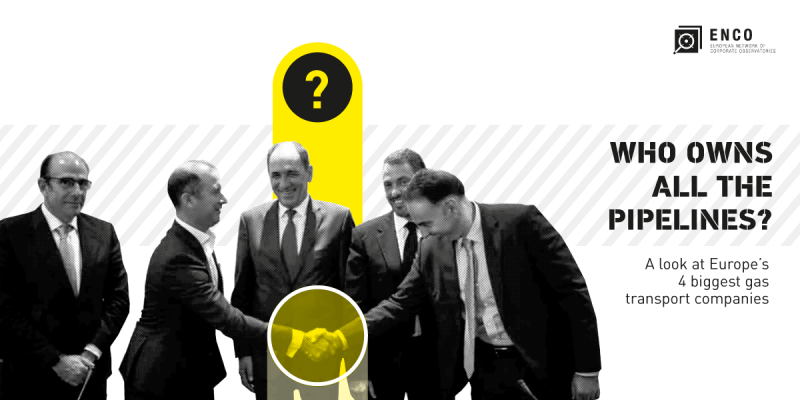
Pipeline profiteers deepen EU reliance on fossil fuels
Europe’s four biggest gas transport companies own half the EU’s LNG terminals and enough pipeline to stretch around the world two and a half times. A new briefing by the European Network of Corporate Observatories reveals that their lobby influence has secured EU support for yet more lucrative infrastructure projects to expand an already under-used gas network. In the midst of the climate crisis, the political influence of Enagás, Fluxys, GRTgaz, and Snam is anchoring fossil gas deep in the EU energy system.
“Who owns all the pipelines” zooms in on four gas companies that wield big influence while keeping a low profile. Little-known Spanish Enagás, Belgian Fluxys, French GRTgaz, and Italian Snam are Europe’s largest gas transporters.
Although nominally publicly-controlled, they are run like private companies and their shareholders include major financial investment funds like BlackRock, who are keen to see steady returns. The four companies collectively made more than €2 billion in profit in 2018 with almost three quarters paid out in dividends.
The drive for more gas infrastructure is reflected in their EU lobbying: uncovering the lobby spending, meetings, and connections of the four gas infrastructure giants, the briefing (alongside a map) sheds light on the hefty influence of an often-overlooked group of corporations over EU energy and investment policies.
Key findings include:
-
a combined lobbying firepower of Enagas, Fluxys, GRTgaz, Snam and their paid-for lobby groups that amounts to almost 50 lobbyists targeting the EU Parliament, European Commission officials, and the EU Council.
-
the 82 meetings with the EU Commission since November 2014, which focused on many controversial pipeline projects such as MIDCAT and TAP, as well as the highly controversial role of gas in a future energy system.
-
a total lobbying expenditure from Enagas, Fluxys, GRTgaz, Snam and their paid-for lobby groups of more than 3 million euros a year – a small sum compared to the returns made from new gas infrastructure projects.
On a day when EU Climate Commissioner Miguel Arias Cañete gives the keynote speech at an event co-organised by Brussels’ biggest gas lobby group GasNaturally, the new briefing questions the wisdom of giving the gas industry such privileged access to decision-makers.
ENCO member group Corporate Europe Observatory’s climate and energy campaigner Pascoe Sabido said:
“With their total annual profits last year exceeding 2 billion euros, Europe’s four biggest gas transporters have a huge stake in keeping the EU locked into an energy system dependent on gas.
“These gas companies have been leveraging their financial and political firepower to make sure the EU invests ever more public money into new construction projects in the sector, although such long-term investment only serves to stall the energy transition – and secure more profits for the fossil fuel industry in the middle of the climate crisis.”
ENCO member Re:Common’s energy and climate researcher Elena Gerebizza said:
“With their lobbying firepower, these companies have helped to build the narrative of gas as a ‘transition fuel’, co-opting the political discussions and decision making around the urgently needed energy transition in Europe for their own business interests.
“This misleading fairy tale has cost us much valuable time and risks to waste even more public money when we are facing a climate emergency that is about to spiral out of control”.
----ENDS----
Contact details:
Pascoe Sabido, Corporate Europe Observatory: pascoe@corporateeurope.org; +44 7969 665 189
Notes to editor
-
Find the full briefing and the map here. (Available in English, Italian, Spanish, French, and Flemish Dutch.)
-
The briefing and map are published by the European Network of Corporate Observatories (ENCO), a collaboration of European civil society organisations dedicated to researching and addressing the role and power of transnational corporations
-
The research and writing was contributed by Corporate Europe Observatory (CEO, EU-level), Re:Common (Italy), Observatori del deute en la globalització (ODG, Spain), Observatoire des Multinationales (France), and Gresea (Belgium).
-
For a high-quality PDF of the map, click here.
-
For the programme of the event with Cañete co-organised by GasNaturally, see here
